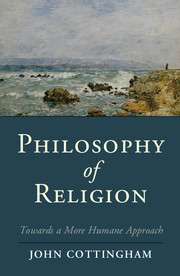2 - Metaphysics
Published online by Cambridge University Press: 05 September 2014
Summary
Der Sinn der Welt muß außerhalb ihrer liegen. (‘The sense of the world must lie outside of it.’)
WittgensteinArguing for God
The conclusions reached in the previous chapter suggest, amongst other things, that there may be reasons to be wary of wholly detached and neutralist models for philosophizing about religious belief. And this in turn has significant implications with respect to the established canon of philosophical arguments about the existence of God that bulks so large in the philosophy of religion as commonly practised. Countless textbooks take the standard arguments for God as their starting point, beginning with Anselm's famous ‘ontological argument’ put forward in the eleventh century, and moving on to the celebrated ‘Five Ways’ of proving God's existence deployed by Thomas Aquinas in the thirteenth. As is well known, these two great Christian philosophers take contrasting approaches to their task. The Anselm argument proceeds purely a priori, without depending on observational evidence, and proposes that God, defined as ‘that than which nothing greater can be thought’, must exist not just in the mind but in reality. In contrast to this a priori approach, Thomas Aquinas starts from observation of the world around us, reasoning that five features found in the cosmos (motion, causality, contingency, perfection, and purposiveness) allow us to infer the existence of something ‘which all men call God’, which must be the ultimate source of these things, or that on which they depend.
- Type
- Chapter
- Information
- Philosophy of ReligionTowards a More Humane Approach, pp. 25 - 47Publisher: Cambridge University PressPrint publication year: 2014

